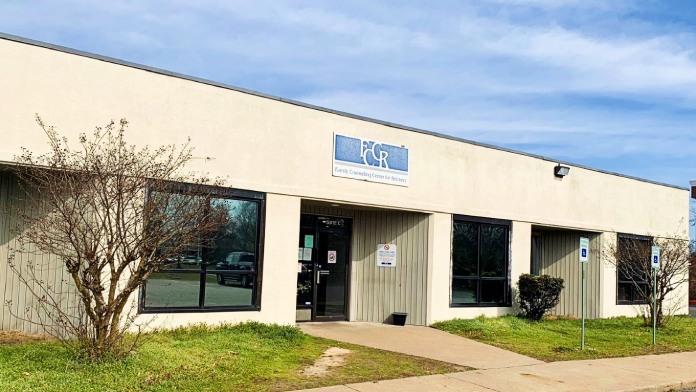
About FCCR Southlake
FCCR Southlake is an outpatient opioid use clinic in North Chesterfield, a suburban community just southwest of Richmond, Virginia. This location is about four miles north of Rockwood Park with easy access to nearby cities like Bon Air, Midlothian and Manchester. FCCR Southlake provides compassionate medication assisted treatment (MAT) to help individuals and families in these communities reclaim their lives from opioid use. They have professional tracks for doctors, nurses, and lawyers. Plus, a dedicated program for pregnant women in recovery.
They accept Medicaid, Medicare & Medicare Advantage Plans and several commercial health insurance plans. They even accept out-of-network coverage.
Medically Supervised Withdrawal & Medication-Supported Recovery
Recovery in FCCR Southlake begins with a thorough clinical evaluation. The clinic offers short-term, high-intensity medically supervised withdrawal to help you safely manage acute symptoms and MAT to support long-term stability and abstinence. Their MAT involves a personalized prescription of either Suboxone or methadone to ease cravings and alleviate painful withdrawal symptoms.
This lets you focus on outpatient therapy (OP) to tackle underlying psychological and emotional symptoms. Group and individual therapy sessions build resilience and gain practical tools that support sobriety. You’ll also attend on- and off-site 12 Step meetings and SMART Recovery groups to build connection, accountability and confidence in your sobriety. They encourage family involvement via sessions with your close relatives to mend relationships.
Their full spectrum of services includes aftercare monitoring to help you stay on track after treatment and case management to connect you with the resources and support needed for long-term stability.
| Levels of Care | Detox Service Setting | Programs | Payment Options |
|---|---|---|---|
|
Inpatient and residential programs provide round-the-clock medical and emotional support as you live at the treatment facility. This level of care may be recommended if you have severe addictions or mental health conditions since it removes outside distractions and allows you to focus solely on therapy. |
In outpatient therapy, you’ll attend therapy sessions several times each week while living at home. This is ideal if you have a strong support system and a lower risk of relapse. Outpatient treatment offers flexibility to maintain work, school or family obligations. |
||
|
Inpatient detox occurs in a dedicated treatment facility. You’ll live there around the clock and receive intensive medical support and supervision to help manage your withdrawal symptoms. It is suitable for individuals with moderate to severe addictions as it ensures a stable detox environment. |
Outpatient detox gives you access to medically supervised withdrawal services while still allowing you to live at home. You’ll attend a clinic for treatment and monitoring. This flexible option is suitable for those with mild to moderate withdrawal symptoms who have strong support systems. |
||
|
Alcohol detox programs offer medical support to help individuals withdraw safely from alcohol. Your care team may use medications to ease your symptoms and provide medical monitoring to address complications. |
Drug detox programs support individuals who are withdrawing from addictive substances like cocaine and heroin. Medical support helps you manage symptoms in a controlled and safe environment so you can achieve initial sobriety. |
||
|
Private Insurance
|
Self Pay
|
Levels of Care
Inpatient and residential programs provide round-the-clock medical and emotional support as you live at the treatment facility. This level of care may be recommended if you have severe addictions or mental health conditions since it removes outside distractions and allows you to focus solely on therapy.
In outpatient therapy, you’ll attend therapy sessions several times each week while living at home. This is ideal if you have a strong support system and a lower risk of relapse. Outpatient treatment offers flexibility to maintain work, school or family obligations.
Detox Service Setting
Inpatient detox occurs in a dedicated treatment facility. You’ll live there around the clock and receive intensive medical support and supervision to help manage your withdrawal symptoms. It is suitable for individuals with moderate to severe addictions as it ensures a stable detox environment.
Outpatient detox gives you access to medically supervised withdrawal services while still allowing you to live at home. You’ll attend a clinic for treatment and monitoring. This flexible option is suitable for those with mild to moderate withdrawal symptoms who have strong support systems.
Programs
Alcohol detox programs offer medical support to help individuals withdraw safely from alcohol. Your care team may use medications to ease your symptoms and provide medical monitoring to address complications.
Drug detox programs support individuals who are withdrawing from addictive substances like cocaine and heroin. Medical support helps you manage symptoms in a controlled and safe environment so you can achieve initial sobriety.
Contact

Chika Uchendu is a multi-niche and seasoned SEO writer with expertise in personal finance, technology and health. He’s had over 10 years of experience creating impactful content that resonates with diverse audiences. His journalism and digital marketing background enables him to combine data-driven analysis with engaging storytelling. This helps drive engagement and grants target audiences access to valuable information.
Chika has worked for Benzinga, Motley Fool, Webopedia and many other popular online media outlets on a freelance and contractual basis. He is using his voice to drive awareness and meaningful change among people dealing with the pandemic of substance use disorder. Chika is an ambivert who enjoys sports, hiking, reading and video gaming.

Peter W.Y. Lee is a historian with a focus in American Cold War culture. He has examined how popular culture has served as a coping mechanism for the challenges and changes impacting American society throughout the twentieth century.




